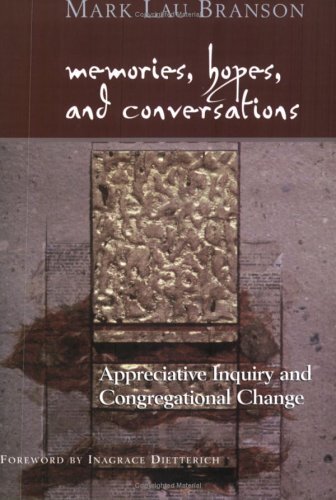Mark Lau Branson, Memories, Hopes, and Conversations: Appreciative Inquiry and Congregational Change. Alban Institute, 2004.
Referenced in: Strategies for Church Renewal – Whole Systems, Large Group
LifeandLeadership.com Summary
Appreciative Inquiry (AI) is a Whole Systems approach to congregational renewal that has been useful in churches. Branson has provided the best available introduction and overview of AI principles as related to churches, alongside the story of a congregation that used AI as a tool toward renewal and hope. In the opening, he says,
The thesis of Appreciative Inquiry is that an organization, such as a church, can be recreated by its conversations. And if that new creation is to feature the most life-giving forces and forms possible, then the conversation must be shaped by appreciative questions. (xiii)
In chapter 1, he relates the story of a 90 year old congregation’s experience of hope and renewal using AI. Chapter 2 presents the basics of AI theory. Chapter 3 proposes biblical intersections with AI. Chapters 4 and 5 give instructions for churches who want to use AI, and chapter 6 lays out potential schedules and scripts for implementation. Numerous appendices include introductory exercises, distinctions between problem-solving and AI, assumptions and processes of AI, the relationship of AI to the new science of leadership, biblical reflections, theoretical considerations, and samples of various AI components.
This is the best place to start in understanding how AI helps congregations process important issues and create new futures through the appreciative conversations of its members. AI is a very specialized field of practice. Those wishing to use it should supplement Branson with some of the other benchmark resources on AI and other Whole Systems approaches in the Resource Guide.
From the Publisher
When First Presbyterian Church in Altadena, California, was asked to provide a mission study report for its pastor nominating committee, the congregation was afraid they would find themselves engaging in busy work and producing a report that would wind up in a file gathering dust. They then asked professor Mark Lau Branson to consult with them on writing this report. He invited them to join in a process of Appreciative Inquiry—a transformational organization change process—which resulted in a major shift in congregational conversations and a new sense of hope.
Memories, Hopes, and Conversations recounts the experience of First Presbyterian and outlines a process that any congregation can utilize to harness the energies of the congregation at all levels of its common life. Branson first leads readers through the foundations of Appreciative Inquiry and bracingly explores biblical texts for understanding the practice in a faith context. He then outlines and illustrates a four-step process—Initiate, Inquire, Imagine, Innovate—that creatively employs constructive conversations and questions to evoke storytelling and spur imaginations.
Branson persuasively demonstrates how concentrating on needs and problems can mire a congregation in discouragement and distract it from noticing innate strengths. By focusing on memories of the congregation at its best, members are able to construct “provocative proposals” to help shape the church’s future. Grounded in solid theory and real-life practice, Memories, Hopes, and Conversations is a groundbreaking work of narrative leadership and the first book to apply the principles of Appreciative Inquiry to the lives of congregations.
About the Author
Mark Lau Branson is Homer L. Goddard Associate Professor of Ministry of the Laity at Fuller Theological Seminary. Known for his skillful weaving of biblical theology, theory, and practice for the purpose of congregational formation, his other publications include The Reader’s Guide to the Best Evangelical Books and Conflict and Context: Hermeneutics in the Americas.
***For additional information on this resource, including reviews, click the bookstore links. Check the reference at page top or the links below for resource guides on related topics.***
See Resources on Over 100 Areas of Ministry Leadership:


